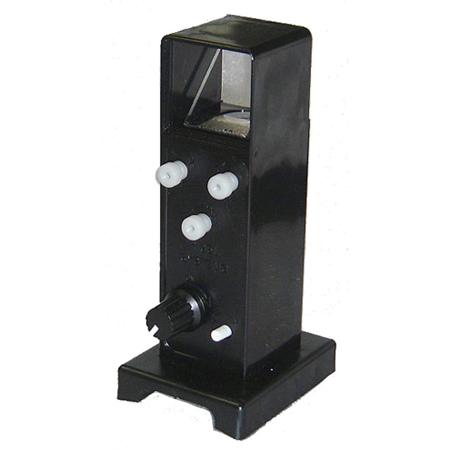
Overview
Compare
Specs
Protection
Reviews about this item
Review Summary
2016-11-09T07:35:14
Rated 5 out of 5
Well made, good size and works great.
I seem to prefer zero X, red dot or circle finders and this is among the best. It is well made and easy to install just about anywhere on your scope for a comfortable view. And the view is excellent with the concentric circles. It's easy to center an object or area with little effort or strain. A complete range of luminosity and the blinker is an added plus. There is no play in the mounting as you may find on other red dot types. And the ability to use it on more than one instrument with a complete remount is a plus, though I keep it on my 80mm refractor. Definitely worth the cost and a keeper.
JOSEPH D.
2014-04-28T21:00:00
Rated 4 out of 5
Best finder I've used.
Easy to mount and align. Compact and lightweight, with a small footprint. Brightness is easier to adjust than the Telrad that it replaces (the Telrad died from corroded batteries). My only concern is the quality of construction. The mount mechanism and the battery compartment fit VERY tight and require a combination of force and finese.
BRUCE J.
2012-08-31T21:00:00
Rated 5 out of 5
This is the second Rigel unit I bought.
Rigel: Great product. Adorama: good to buy from.
Harvey
2012-01-11T19:00:00
Rated 5 out of 5
Great product for your telescope!
After doing some research, I took the plunge and bought the Rigel Quikfinder to replace the red dot finder on my Celestron AstroMaster 114EQ telescope. Installation was a snap, and setup/alignment didn't take long. The first object I pointed it to was Jupiter, and when I looked in the scope eyepiece, BAM Jupiter was smack in the middle! Next, I sought out Rigel and Mintaka (leftmost star in Orion's belt) and had the exact same result. Highly recommended!
keyroute
2010-11-05T21:00:00
Rated 5 out of 5
Don't Leave The Galaxy WIthout It
Almost every telescope needs an aiming device. Easiest to use are the "zero" power versions. Compared to the Telrad, the Rigel Quik Finder is far lighter and compact, and costs a bit less. In contrast to various finders adopted from air rifle sights, the Quik Finder needs no tiny hex keys either to mount or adjust it. That's particularly important when working in the dark.While one centers a "guide star" in the middle of the smaller of two concentric projected red rings, which is half a degree, the size of the moon, beyond that the outer two degree ring facilitates "star hopping," from a known star, to a typically naked eye invisible "deep sky object." Its variable illumination also helps, as does the adjustable blink rate, especially when trying to use fainter guide stars.For centering your telescope's field of view over star clusters, nebulae or even galaxies, a Quik Finder works well. Don't leave the galaxy without one!
ALAN B.
2009-04-07T21:00:00
Rated 5 out of 5
Very nice little unit
This is a very nice little unit with all the features you would want, especially for the modest price.
SkyViewer
Rigel Systems QuikFinder Reflex Sight Specifications
About Rigel Systems QuikFinder Reflex Sight
FEATURED REVIEWS
Don't Leave The Galaxy WIthout It
By ALAN B.
Almost every telescope needs an aiming device. Easiest to use are the "zero" power versions. Compared to the Telrad, the Rigel Quik Finder is far lighter and compact, and costs a bit less. In contrast to various finders adopted from air rifle sights, the Quik Finder needs no tiny hex keys either to mount or adjust it. That's particularly important when working in the dark.While one centers a "guide star" in the middle of the smaller of two concentric projected red rings, which is half a de...
View full Review
Very nice little unit
By SkyViewer
This is a very nice little unit with all the features you would want, especially for the modest price.
The QuikFinder Compact Reflex Sight, is perfect for binoculars & small and large telescopes. It Makes Starhopping easy with its Pulsed Reticle. The Compact QuikFinder has a black body of rugged construction, tough ABS Plastic and comes standard with 2 Quick-Release Bases, for using on more than one telescope.
QuikFinder attaches without drilling and is easily removed from its baseplate for storage. The finder's display projects a variable brightness RED LED image that is dotted with a 2 degree and a 1 degree circle on the lens element.
A built-in Dew Cap comes standard. The unit is powered with a 3-Volt lithium battery,(included). The finder also has an adjustable brightness display that is settable to remain constantly lit, or pulse-blink at rates as fast as several times a second, allowing easier viewing of dimmmer stars, when starhopping.
Rigel Systems QuikFinder Reflex Sight Features
- One Tenth the size & weight of some other "reflex" sights, makes aiming your telescope easy with its wide-open right-side-up view.
- Projects 1/2 and 2 Degree Red circles Onto the Night Sky in focus with the stars.. what you see in the red circles is what you get in your telescope
- Pulsed or Continuous Illumination of Reticle.. at your behest. A standard feature on QuikFinder, a $20 option on other reflex sights.
- Compact Design Lets You Use Both Eyes to see fainter than with other "reflex" sights.
- Two Baseplates Lets You Use It on Two Telescopes. Easy clip-on / clip-off mounting to baseplate (no screws to fumble with).
Key Features
- Compact Design Lets You Use Both Eyes to see fainter than
What's in the box:
- QuikFinder Reflex Sight
- 2 Quick-Release Bases
- Built-in Dew Shield
- 3-Volt Lithium Battery